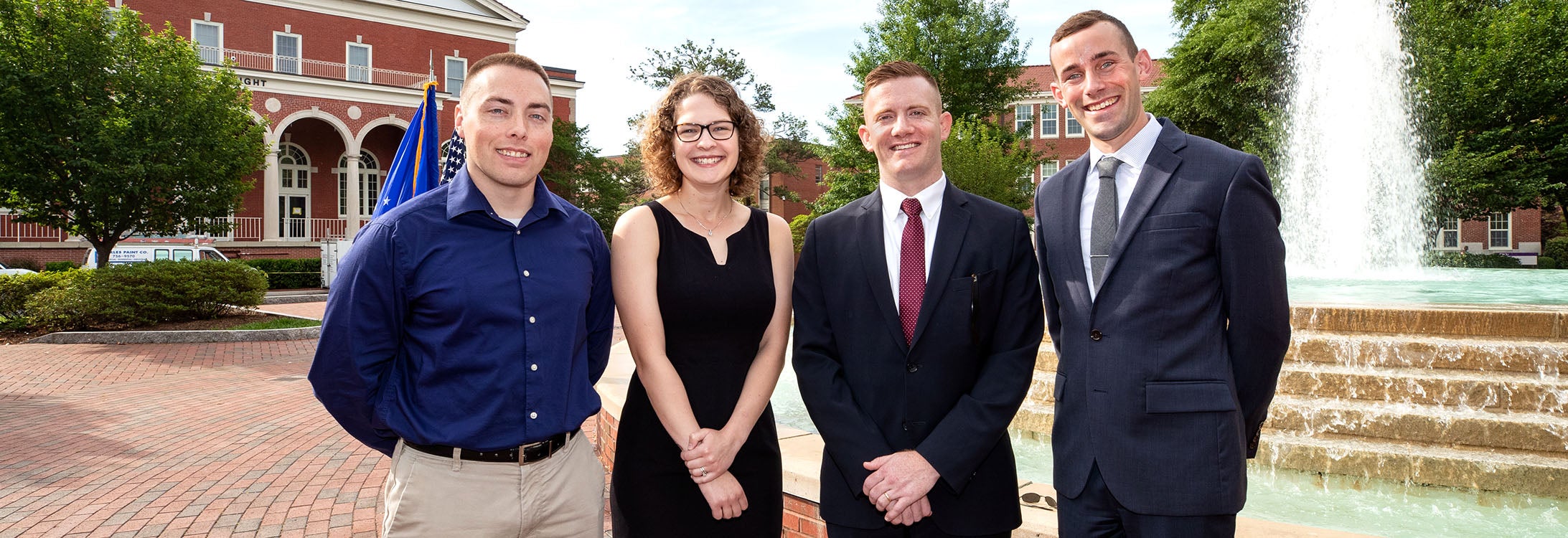SERVING OUR COUNTRY
Four ECU psychology students commissioned into U.S. Air Force over past year
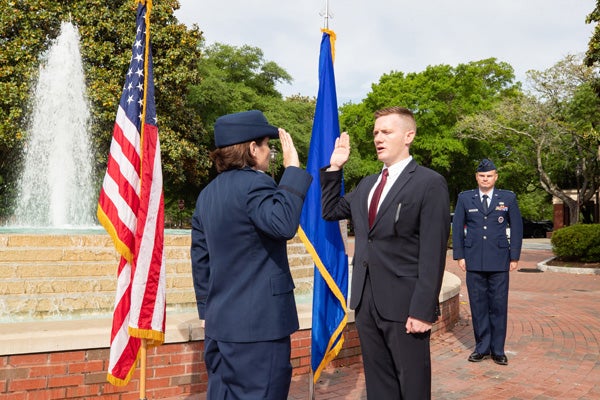
Capt. Matthew Carrowan (right) looks on as Kropp takes his oath, led by Lt. Col. April Wimmer. (Photo by Rhett Butler)
This May, three East Carolina University health psychology doctoral students were commissioned into the U.S. Air Force, bringing the total to four students commissioned from one program in the past year.
“This is probably unprecedented for a program anywhere,” said Dr. Samuel Sears, professor and director of the program. “We are very proud of this accomplishment.”
Capt. Jordan Ellis and Capt. Caley Kropp, who are pursuing the clinical health psychology concentration, were commissioned on May 2. Second Lt. Taylor Zurlinden, who is pursuing the clinical neuropsychology specialty, took her oath on May 17, and 2nd Lt. David Sager took his oath last summer, on July 13, 2018.
“These four students have committed their lives to serving our country. The faculty and staff within the Department of Psychology are proud of our students and are thrilled that we are able to train psychologists who serve in the military,” said Dr. Erik Everhart, professor and interim chair of psychology. “It is also important to recognize the critical role and commitment of our military in training psychologists.”
Prior to their degree completion, each student will participate in a one-year internship funded by the Air Force and then complete a minimum service commitment with the Air Force.
“I am overwhelmed by the support of everyone,” Ellis said during his commissioning. “I am incredibly excited to be able to serve in the Air Force as a psychologist, to serve the men and women who are making sacrifices every day.”
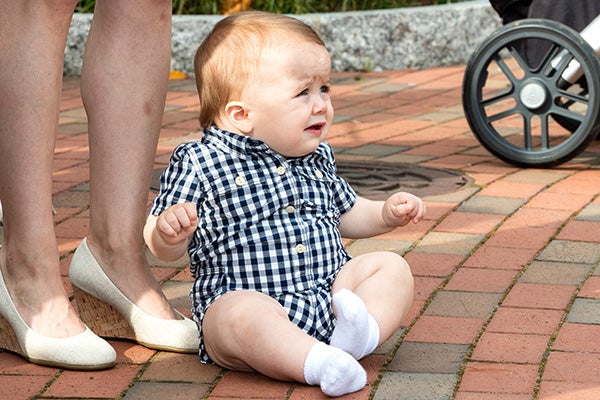
Baby Kropp sits in front of friends and family observing the commissioning ceremony on May 2. (Photo by Rhett Butler)
Kropp also thanked those in attendance, including his and the Ellis family, the psychology faculty and staff, and other colleagues and support systems.
“Jordan and I, and many of us here, are fortunate to be part of a field that helps people every day. I can’t think of another group of people that deserve the very best,” Kropp said. “I have always wanted to serve my country in some way, and I’m excited to have been given the opportunity to do that.”
This summer, Ellis and Kropp will participate in a five-week officer training program. Following officer training, they will begin their year-long internship at Lackland Air Force Base in Texas and receive their doctoral degrees in spring 2020.
During their residency at Lackland, Ellis and Kropp will work at Wilford Hall Ambulatory Surgical Center, the Air Force’s premier health care and medical education and research facility. They will have the opportunity to participate in rotations performing general mental health assessment and treatment, clinical health and integrated primary care.
“This year of training will sharpen my clinical skills and increase my knowledge across different settings in a military medical center,” Kropp said. “I am looking forward to having the opportunity to support the Air Force mission through providing psychological assistance to service members and their families and learning from some of the top clinicians in the country in a multidisciplinary setting.”
Kropp said his goal is to continue to serve in the Air Force for as long as he is fit to do so, and if he decides to serve in a civilian setting, he will look for opportunities at an academic medical center or Veterans Affairs hospital.
Ellis, whose ECU research includes motivation in cardio pulmonary rehab and adult picky eating behaviors, also believes he will stay within the military for the duration of his career, and he wants his emphasis to be in health psychology.
“I really want to focus on population-based behavior change and prevention efforts,” Ellis said. “It’s a young, healthy population. So how do we encourage healthy behaviors early on to prevent problems from showing up later?”
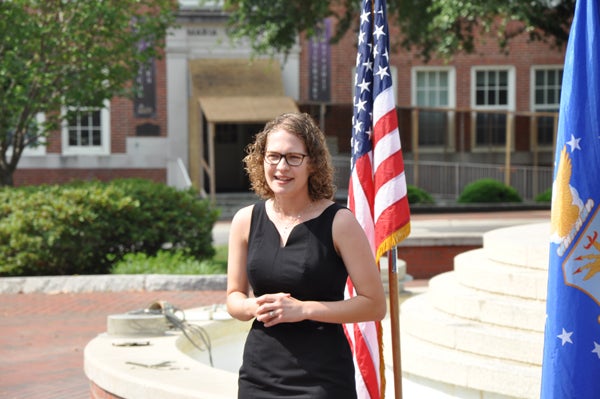
Zurlinden thanks her husband for his support at her commissioning ceremony on May 17. (Photo by Latoya Vines)
Zurlinden, who has two years left in her doctoral studies, thanked the psychology administration, friends and family at her commissioning ceremony.
“Most of all, I want to thank my husband,” Zurlinden said. “A lot of people probably don’t know, but before we started dating, I told him that I wanted to be in the Air Force and he either better get on board or get out – which in hindsight does sound terrible, but he’s been nothing but supportive, so I’m truly blessed.”
Zurlinden’s grandparents, and an uncle who served in the military, influenced her decision to pursue a military career. She said she did not realize, at first, all that she could do in the Air Force.
“It’s so exciting, because they never do the same thing two days in a row,” she said. “I think that’s an exciting career where you get to pick what you do, what you enhance and how you shape your day.”
Recently, through a rigorous submission process and the assistance of ECU psychology faculty mentors, Zurlinden applied for and was awarded a scholarship through the Health Professions Scholarship Program.
The HPSP is a service scholarship available to students in the Army, Navy or Air Force. Only five or six applicants nationwide are selected to receive the prestigious award each year, which covers tuition, fees, books, room and board, and a monthly stipend. This program will support Zurlinden through her final two years at ECU.
Zurlinden is still considering her career path once she has completed her degree, internship and service commitment. In a neuropsychology career, she may have the opportunity to enhance new equipment to test and understand the brain functions of pilots, work with paratroopers whose parachutes do not deploy and treat traumatic brain injuries. She is also considering a traditional clinical health career path, where she may treat overall mental health and provide medical intervention.
Sager also received the prominent HPSP scholarship prior to his commissioning in 2018, which will continue through his graduation in 2020.
As a student in the clinical health psychology program, Sager has received training in both traditional clinical and medical settings. He has participated in research on the psychological effects of cutting edge cardiac-related technologies to manage and detect symptoms of heart failure as well as atrial fibrillation.
“While the portion of my journey physically at ECU is approaching an end, I’ll always be a Pirate no matter where military service or other opportunities for service take me,” Sager wrote in an article for Harriot College’s fall 2018 alumni magazine, Cornerstone. “The relationships and the intellectual curiosity supported at ECU are something that will be integral to my experiences and practice going forward.”
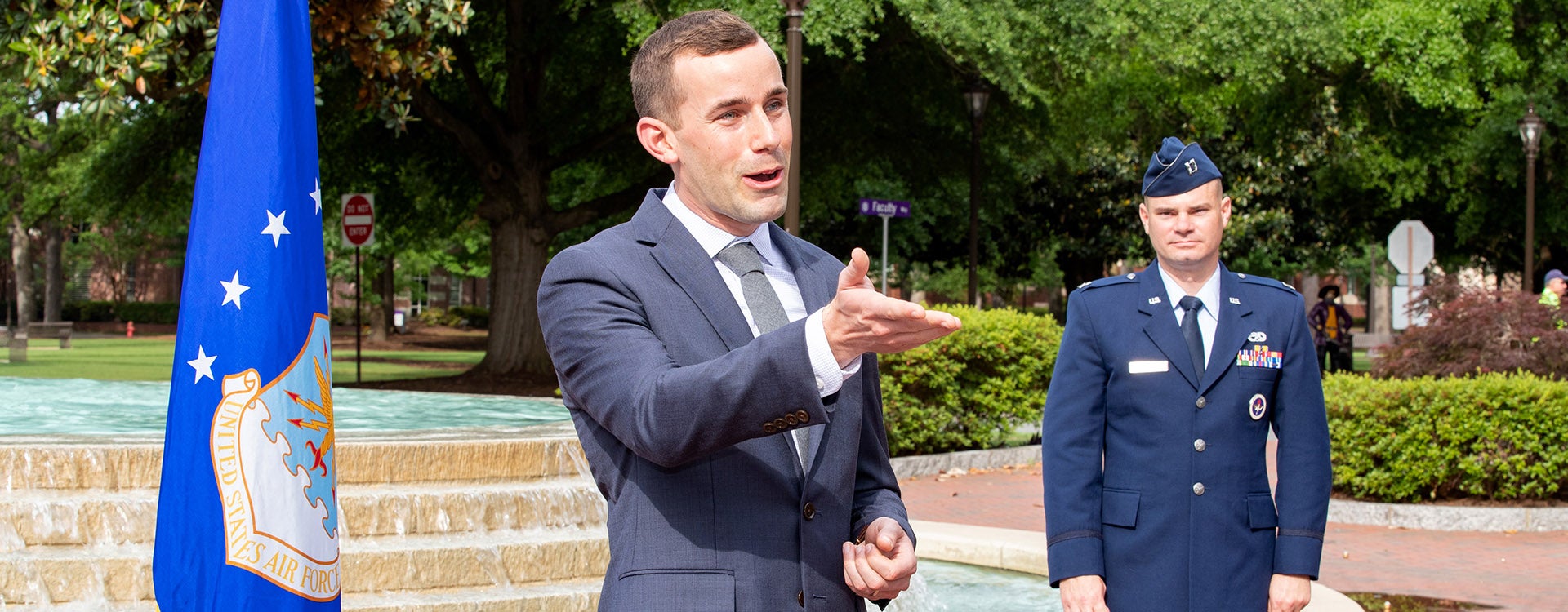
Ellis acknowledges and thanks his family for their support of his mission. (Photo by Rhett Butler)
